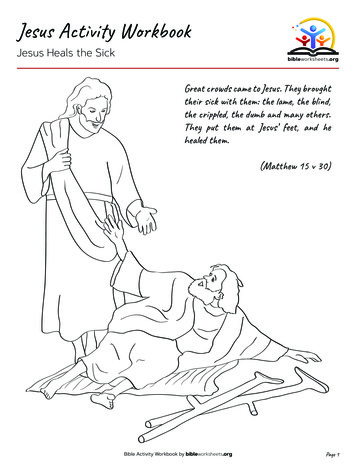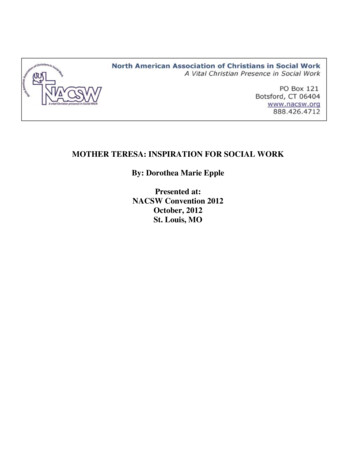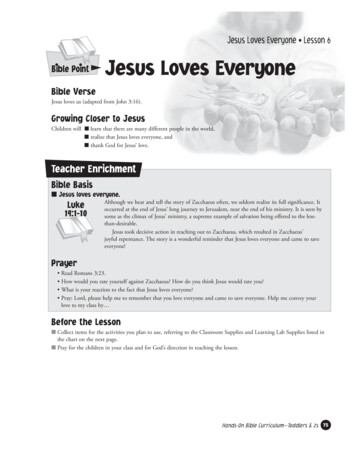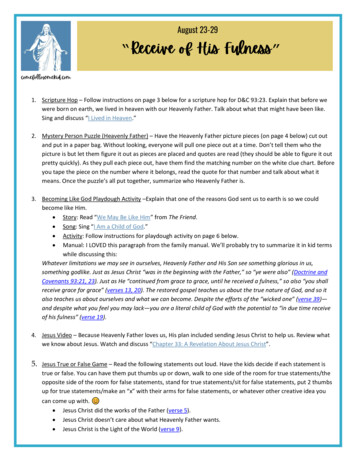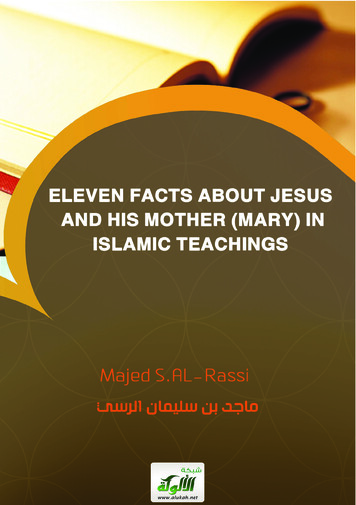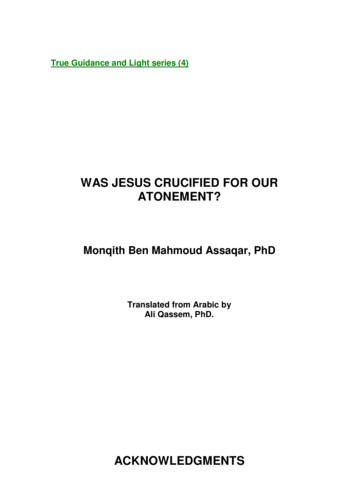
Transcription
True Guidance and Light series (4)WAS JESUS CRUCIFIED FOR OURATONEMENT?Monqith Ben Mahmoud Assaqar, PhDTranslated from Arabic byAli Qassem, PhD.ACKNOWLEDGMENTS
WAS JESUS CRUCIFIED FOR OUR ATTONMENT?(١)First, all praise and thanks to Allah - God Almighty. It is with greathonor that I present this humble work to my reader, hoping that GodAlmighty will help him benefit from it, and makes him and me amongthose who know the truth and among the guided.Following the tradition of prophet Mohammad (PBUH) in thankingpeople who did us a favor, I would like to thank the many people whoI benefited from in completing this work, and possibly my success inthis work was a result of their prayers to God Almighty to help me todo so.I wish to express my appreciation and gratitude to my noble parents,who have done the greatest favor for me, in continuously fosteringand cherishing me. I also extend my appreciation to my faithful wife,for her continuous support, help, and for her standing beside meduring the completion of this work.I would also wholeheartedly like to express my thanks and gratitudeto the translator, who played a major role in enabling this book toreach the English speaking reader, Dr. Ali Qassem.I also extend my thanks and appreciation to all my brothers, friendsand colleagues, who played any role in the completion of this book.Munqidh Bin Mahmoud Assaqqar, PhDINTRODUCTION
True Guidance and Light series (4)(٢)Praise to Allah1 (S.W)2, the cherisher and sustainer of the worlds,and may peace and blessings be upon all of His messengers.In our previous parts of this series “True guidance and light series”,we have concluded and confirmed a plain truth, which is that theHoly Bible, as we have seen, is man work, and not the word of Allah(S.W) in any way. Thus, Christians cannot present it as evidence forany of their creeds or events, including the crucifixion and theAtonement.In order to continue the discussion with Christians, and to avoidclosing this topic, we put forward two following questions, one ishistorical, and the other is theological.The first question is; did Jesus (PBUH)3 die on the cross, as theGospels mention and the contemporary Christian sects agree?The second question, which is related to the first - we ask it just forthe sake of argument - is, assuming that Jesus died on the cross,was he crucified to atone us and humanity?Following these two questions, many other questions will arise.What is the salvation from; is it from the Hellfire or from the world'stroubles and miseries?Is it a salvation from our parents’ (Adam and Eve) sins only, or all ofour sins?1- Muslims prefer using the name “Allah”, which is one of many other beautiful names and it is GodAlmighty’s greatest name, instead of the English word “God”. The word “Allah” is pure and uniqueunlike the English word “God”, which can be used in many forms. If we add ‘s’ to the word “God” itbecomes “Gods”, that is a plural of God. Allah is one and singular, there is no plural of Allah. If we add‘dess’ to the word ‘God’, it becomes ‘Goddess’, that is a female God. There is nothing like male Allah orfemale Allah. (taken from: “The Concept of God in Major Religions”, Dr. Zakir Abdul Kareem, pp 18)(Added by the translator)2- Muslims do not mention the name of Allah without glorification. The letters “S.W” is an abbreviationof the two Arabic words “Sobhanahu Wataala”, which means, “Glory to Him! He is high above all”(Holy Quran 17:43). The English meaning of these two words is from the “Meaning of the Holy Quran byAbdullah Yusof Ali”. Therefore, in this book I will use the words “Allah (S.W)” when referring to GodAlmighty, except for excerpts and quotations.(Added by the translator)3- Muslims also do not mention the name of a Prophet without honoring him with prayer and invocation.The letters “PBUH” is an abbreviation of the sentence, “Peace Be upon Him” when mentioning a prophet,or “Peace Be Upon Her” when mentioning the Pure Virgin Mary, and the letters “PBUT” is anabbreviation of the sentence, “Peace Be Upon Them”, when mentioning more than one prophet. (Added bythe translator)
(٣)WAS JESUS CRUCIFIED FOR OUR ATTONMENT?Is it conditional or is it a love gift from Allah (S.W) and his Christ,which is far great to be reciprocated?Is the salvation for the Jews only, to whom Jesus (PBUH) was sent,or for the whole human beings, which were born full of sins?We will answer these questions and others, in our forth episode ofthis series, concluding them in one question, was Jesus crucified forour atonement?We will answer these questions objectively, logically, andscientifically; searching the pages of the Christian Holy Bible, takingour minds, our instincts and our reasoning as the judge , consideringthe professes of the history and the wisdom of Christianity’s wisemen as evidence.Oh our Lord (Allah S.W), guide us to the truth by your will, indeed,you guide whom you want to the right path. Amen.Dr. Monqith Ben Mahmoud AssaqarMakkah Al MokarramahShaaban, 1424 Hejramunqidh@maktoob.comJesus’ crucifixion in Christianity
True Guidance and Light series (4)(٤)Christians consider the crucifixion as the most important event in theworld and history. They believe that Allah (S.W) sent his son (Jesus)to die on the cross, to save humanity from the sin of their fatherAdam, and all their sins as well.The Gospels assure - in long chapters- Jesus’ (PBUH) crucifixion,mentioning details of his capture, his prosecution, his crucifixion, hisburial then his resurrection, and lastly, his ascending to heaven.What indicates the importance of the crucifixion in the Christian beliefis that Christians believe that God incarnated in Jesus for thecrucifixion of God himself. The famous Protestant reformer TomasAconite (called the angelical doctor) described this as he said, “Thereare many opinions regarding the incarnation, some claim that theSon of God would have incarnated even if Adam did not commit asin, while others believe the contrary. It seems more correct to takethe second opinion; as the Bible always tells us, “The first human sinwas the reason for God’s incarnation”. Thus, we see that God madethis incarnation to remedy the sin. Means without sin would be noincarnation.” 1In his book “Eternity Priesthood”, the English cardinal, Mining,described the importance of this event. He said, “The importance ofthis event, which causes confusion, is clear! If Jesus’ crucifixion wasnot real, then all Christians’ beliefs would be destroyed from theroots. If He did not die on the cross, there would be no sacrifice, nosalvation, and no Trinity. Paul, the apostles, and all churches, alsoclaim that if Jesus did not die, there would be no resurrection”.In his book “The crucified God”, Jordan Maultman said, “Jesus’ deathon the cross is the mainstay of Christianity. All Christians’ beliefsabout God, creation, sins, and death are taken from the crucifiedChrist”. 2This is what Paul assured when he canceled the role of the Law,depending on Jesus' (PBUH) crucifixion to amend the sin; Jesussaved us from the Law’s curse by doing so. He said, "And if Christhas not been raised, then our preaching is in vain andyour faith is in vain." (1 Corinthians 15:14)12- Christ, Human or God. Moh’d Majdi Morjan. Pp 150.- The Crucifixion of Christ Between Fact and Claim. Ahmad Deedat, pp 10
(٥)WAS JESUS CRUCIFIED FOR OUR ATTONMENT?Thus, we can see clearly the importance of this event in the Christianbelief, as Christians believe that it is the mainstay of human life inthis world.Jesus’ crucifixion in IslamThe Islamic opinion of Jesus’ (PBUH) crucifixion is that he (PBUH)was never crucified, as the Jews and Christians claim. Muslimsderive their opinion, which oppose what the Gospels mention, fromthe Quranic verses, which confirm this opinion.The Quranic verses mention the conspiracy that happened to Jesus(PBUH). They mention many other things, which the reader couldnotice them. It mentioned Jesus’ (PBUH) rescue from his enemies’conspiracy.Allah (S.W.), while listing His blessings and graces to Jesus (PBUH)says, "And behold! I did restrain the Children of Israel from(violence to) thee" (Alma'ida: 110)This response from Allah (S.W) was on that crucial day, on which theRomans and the Jews conspired in order to kill and crucify Jesus(PBUH). However, Allah (S.W) turned their conspiracy down. "And(the unbelievers) plotted and planned, and Allah tooplanned, and the best of planners is Allah." (Al Imran: 54), Allah(S.W) saved His prophet –Jesus (PBUH) - from their conspiracy anddeception.The Quranic verses mention some accounts of this Jewishconspiracy. "That they said (in boast), "We killed Christ Jesusthe son of Mary, the Messenger of Allah.;- but they killed himnot, nor crucified him, but so it was made to appear to them,and those who differ therein are full of doubts, with no (certain)knowledge, but only conjecture to follow, for of a surety theykilled him not:- Nay, Allah raised him up unto Himself; and Allahis Exalted in Power, Wise". (An NiSA':157-158)Another verse pointed to Jesus’ (PBUH) rescue and his ascending toheaven. "Behold! Allah said: "O Jesus! I will take thee and raisethee to Myself and clear thee (of the falsehoods) of those whoblaspheme; I will make those who follow thee superior to thosewho reject faith, to the Day of Resurrection." (Al Imran: 55)
True Guidance and Light series (4)(٦)The verses also pointed at his rescue. Allah (S.W) says, "He shallspeak to the people in childhood and in maturity." (Al Imran: 46)It is known that Jesus (PBUH) was ascended to heaven in histhirties. Elderliness, in language, is coupled with old age. Means,after Jesus passing the first stage of his life he will live and reach theelderliness and he will talk to people. There is no other meaning;otherwise, it is not necessary to mention elderliness and his ability totalk when talking about Jesus’ (PBUH) miracles, because every oneis able to talk in his old age, and no miracle in that.The Holy Quran mentions, in another verse, that Jesus (PBUH) willdescend to earth in the last days and before the Judgment Day.Allah (S.W) says, “And (Jesus) shall be a Sign (for the coming of)the Hour (of Judgment): therefore have no doubt about the(Hour).” (Az Zukhruf: 61)Allah (S.W) also says, “And there is none of the People of theBook but must believe in him before his death; and on the Dayof Judgment he will be a witness against them.” (An Nisa’: 159)Neither the Quranic verses nor Prophet Mohammad’s (PBUH)sayings mentioned any details of Jesus’ (PBUH) rescue. Therefore,Muslim scholars had to search for the truth that the Holy Quranmentions from what the people of the book passed to us.Alternatively, they searched the Holy Bible, to find out how Jesus(PBUH) was saved from the Jews’ conspiracy.The Holy Quran mentions the occurrence of the crucifixion but not forJesus (PBUH). It shows the Jews’ and others’ ignorance of theidentity of the crucified person. It also shows their disagreementabout who he was, because Allah (S.W.) made the crucified personlook the same as Jesus (PBUH).Allah (S.W.) says, “They killed him not, nor crucified him, but soit was made to appear to them, and those who differ therein arefull of doubts.” (An Nisa’: 157)The doubt in this verse is about the identity of the crucified person.The Holy Quran does not specify his identity, but it does assureJesus’ (PBUH) rescue and his ascending to heaven. “For of asurety they killed him not:- Nay, Allah raised him up untoHimself; and Allah is Exalted in Power, Wise". (An Nisa’: 157158)
(٧)WAS JESUS CRUCIFIED FOR OUR ATTONMENT?Thus, The Holy Quran mentions Jesus’ (PBUH) rescue and hisascending to heaven. His enemies, who wanted to crucify him, werein doubt and crucified another person. Allah (S.W.) raised Jesus(PBUH), and he will be back before the Day of Judgment. His coming(PBUH) will be a sign of the end of this life on earth.The importance of disproving Jesus’ (PBUH)crucifixion, for MuslimsMuslims believe that prophets die like all human beings and theymight be murdered. The Holy Quran tells us that the Israeli people(Bani Israel) killed many prophets for no reason. Thus, for us, thereis no big deal if a prophet was killed by the criminals and the fools ofhis people. Killing does not harm the killed prophet, but it is aselection from Allah (S.W), and martyrdom for His sake (S.W.) andHis religion.Then, why does the Holy Quran mention Jesus’ (PBUH) rescue, andinsists on disproving Christians in this matter?The Holy Quran mentions Jesus’ rescue to declare the truth, and toprove the weakness of the Jews and their inability to achieve whatthey intended to do. When Muslims talk about Jesus’ (PBUH) rescue,they want to prove that truth, of which their book mentions.In addition, Muslims realize the danger that the crucifixion created. Itturned from being a historical event to an important creed inChristianity. Disproving it would make Christianity meaningless andhas nothing to offer. Hence, the Muslim scholar Ahmad Deedatassured that Christianity could not offer any good to people exceptthe claimed salvation by Jesus’ (PBUH) blood. It cannot - forexample - teach Muslims morals, hygiene, cleanliness or generosity.Therefore, if Jesus’ (PBUH) crucifixion to be disproved, there wouldbe no reason for Christianity to preach or even to exist.One of the theological problems that the idea of crucifixion creates isthe concept of Allah (S.W) in Christianity. That makes Muslims eagerto focus on this matter and deal with it seriously.In the second century C.E, a famous student of Paul named Marcionappeared. He believed that the Jewish God, who gave the Law toMoses (PBUH) and created the world, was a bad one. The good God
True Guidance and Light series (4)(٨)incarnated in Jesus (PBUH), and he is opponent of the God whocreated the world.He imagined a prosecution from Jesus (PBUH) to the Creator andCherisher of the world and the Lord of the earth and heaven - Allah(S.W). He said, “Jesus descended to the Lord of all creations in hisdivine shape blaming Him of his death on the cross. Jesus said tothe Lord of all creations, “It is a judgment between me and you. Donot let any one to be the judge; your own Laws are my judge. Did notyou write in your Law, he who kills must be killed?Then God (The Lord of all creations) answered, “I did write that.Jesus said, “Then, you have to surrender your self to me”. Then Godsaid, “Because I killed you I will give you something instead. All thosewho believe in you, you can do whatever you want with them.Then, Jesus left and took Paul away and explained the deal to him.He sent him to preach that we were bought by this deal, and the justGod sold all those who believe in Jesus to the good God.” 1This absurd belief is natural, which is caused by the contradictionbetween justice and mercy. Saying that Jesus (PBUH) was rescued,puts things in its proper order. Humans will worship their God,knowing that they are worshiping Allah (S.W.), the Most Merciful,Most Generous, and Most Forgiving.In his book “Evidence of Jesus’ Divinity That Need Contemplation”,the Muslim scholar, Mohammad Hasan Abdul-Rahman, assimilatesChristians’ belief of the sin, atonement and the Law, to a story of aking whom his people rebelled against him. He, then, sentmessengers to them, teaching them to be good, do good deeds, andasking them to revert under his power, obeying his laws of peaceand justice.However, his people derided those messengers, killed them, andinsisted in their arrogance. The king became angrier and gave anorder to send his only son, to be insulted and killed as atonement fortheir sins. Those, who believe in this concept, would be honored andtheir sins will be forgiven.1- Christ in the Christian Creeds Resources, Ahmad Abdel wahab, pp 279-280, quoting from “The Historyof Dogma”, Adolf Harnack. See also The Fourth Gospel, Henry De Lavouse pp, 30-36.
(٩)WAS JESUS CRUCIFIED FOR OUR ATTONMENT?He also gave another order to cancel all the previous laws of justiceand welfare. In addition, he gave an order to consider those whobelieve in the new rules as good citizens, regardless of how manysins or crimes they commit.The justification of this law is that the king is just. His justice is topunish the criminals, who ruin and destroy his kingdom.Nevertheless, because he loves them, and he does not want todestroy all the people in the kingdom, he punished his only innocentson. This punishment is equal to the punishment of all people. Hegave an order that his son must be tutored and then crucified.What do Christians think of this king?No one would describe such king as a just or unfair king, but as aridiculous, a stupid and an idiot king.This is the god, whom the altered Christianity wants us to worship.The beliefs of the Crucifixion, the Original Sin, the Atonement, andwhatever related to them, are the reasons of why people detest thisreligion and the spreading of atheism. People do not accept toworship unfair and cruel god, or crucified god, as the god that thechurch wants people to worship.An example of this rebellion, what we witness of the spread ofatheism, which is caused by the belief of god's death because of theAtonement. Niche said, “If God’s idea was to send the sin'saberration to the innocence of the earth, then the believers of thisinnocence should use their axes to destroy this idea.”He also said, “Blessed are the meek, because they do not claimseeing God We became humans, thus, we want nothing exceptthe earthly kingdom. Where did God go? I will tell you where hewent; we killed him, you and me. Yes! We are who killed him; we allkilled him. Do not you smell the divine decay? Gods do decay also.God died and will remain dead” 1The absurdness of the idea of the Original Sin and the Atonement,and its strangeness, made it ridiculous. In his book, “The OriginalChristianity”, J.R Snout said, “Surprisingly, that people nowadays1- Christianity Without Christ, Kamel Saafan, pp 76
True Guidance and Light series (4)(١٠)dislike the idea about Jesus the Son of God or about his saving usfrom our sins, and taking off the punishment; it is unfair, immoral andinappropriate thing to do, and can be ridiculous and absurd.” 11- Christ in the Quran, the Torah, and the Gospel, Abdelkareem Al Khateeb, pp 372
(١١)WAS JESUS CRUCIFIED FOR OUR ATTONMENT?Critical Examination to the Gospels' Crucifixion StoriesUntil Prophet Muhammad (PBUH) in the seventh centaury declaredthe invalidity of Jesus' (PBUH) crucifixion, Christians told Jesus'(PBUH) crucifixion stories generation after generation. They wonderhow he (PBUH) could say such a thing. How could he (PBUH)accuse the apostles and the eyewitnesses, who passed to us writtenevidence of what they saw, of lying?If we ask Christians “Say: "Produce your proof if ye are truthful."(Al-baqara: 111), their evidence for this event are the four Gospels.The Holy Bible, in more than a thousand languages, mentions Jesus'(PBUH) crucifixion and this is the evidence.The Muslim scholar Deedat said that we should examine thisevidence, and examine these four witnesses, who witnessed thecrucifixion.Deedat declared few issues that Muslims notice about thesewitnesses. The first is that two of these witnesses - Mark and Luke had never seen Jesus (PBUH); and never been his disciples. Howcould they be witnesses?The second issue is that the witnesses had not seen the event.According to Mark, all of them had forsook him and fled. "And theyall forsook him, and fled." (Mark 14/50)Any civilized court will reject these witnesses' testimony in less thantwo minuets.These testimonies are recorded in more than five thousand copies.These copies, which Christians are so proud of, not even two ofthem, are identical. Even if they all were identical, not even one ofthem, was written by the author that the book carry his name.1In his book “The Development of the Gospels”, Enoch Pawl said,“The story of Jesus’ crucifixion was not mentioned in the originalcopies of the Gospels”. He retranslated the Greek copy of Mathew’sGospel; and he found that some passages were repeated in theGospel, which means it was re-written later. 2Among the alterations that western scholars noticed in the scriptures,when talking about the crucifixion, that some passages were added12- Jesus’ Crucifixion between reality and falsehood, Ahmad Deedat, pp 18-20- The Dead Sea Scrolls, Ahmad Othman, pp 139-144
True Guidance and Light series (4)(١٢)to the story according to the transcriber’s opinion. The Gospelaccording to Mark mentions, "And the first day of UnleavenedBread, when they killed the Passover, His disciples said toHim, Where do You desire that we go and prepare thatYou may eat the Passover? And He sent out two of Hisdisciples and said to them, Go into the city, and there youshall meet a man bearing a pitcher of water. Follow him.(Mark 14/12-16)In his book, Saint Mark, (pp 376) Denis Nienham believed that mostscholars think that these passages were added later to Mark’s story.They concluded that based on two issues.First: The writer described the event in a way that a Jewish, that wascontemporary with Jesus (PBUH), could not use.Second: The writer of the verse, (17) ("And in the evening Hecame with the Twelve.") (Mark 14/17) (MKJV), talked aboutJesus’ (PBUH) coming with his twelve disciples. He did not knowabout the two of them (Peter and John according to Luke 22/8) whowent to prepare the Passover. If the writer of the verse (17) knewabout that passage he should have mention ten only, not twelve. Itshould be (And in the evening, he came with the ten).Another alteration of the Gospels is what George Caird, thecommentator of Luke’s Gospel Mentioned. The Gospel according toLuke mentions that while Jesus (PBUH) was on the cross he said,"Father, forgive them, for they do not know what they do.(Luke 23/33-34)These words are not mentioned in any of the other Gospels.Moreover, some of Luke’s important transcripts ignored it.Caird said, (pp 251): “It was said that this prayer, might be deletedfrom one of Luke’s first transcripts by one of the transcribers in thesecond century. The editor thought it is unbelievable that God mayforgive the Jews. Noticing the destruction that happened toJerusalem twice, in year 70 C.E and 135 C.E, it was certain that Goddid not forgive them”.11- Jesus in the Christian Creeds Resources, Ahmad Abdel wahab, pp 133-136, 170
(١٣)WAS JESUS CRUCIFIED FOR OUR ATTONMENT?First: The Contradictions of the Crucifixion Stories inthe GospelsThe four gospels – which are the main source of the crucifixion storymention much details about Jesus’ (PBUH) crucifixion. If thesenarrations were inspirations, as the Christians claim, they should beidentical. However, when examining these narrations, we find manycontradictions and differences. That means that some of thesenarrations are wrong, or Matthew is lying in something and Marklying in something else.Among these contradictions:Did the chief priests go to capture Jesus?Who went to catch Jesus? Matthew said, "And a large mobarmed with swords and clubs was with him. They hadbeen sent by the chief priests and the nation's leaders."(Matthew 26/47)Mark added that the writers and elders were among them."And straightway, while he yet spake, cometh Judas, oneof the twelve, and with him a multitude with swords andstaves, from the chief priests and the scribes and theelders. (Mark 14/43) (ASV)1John mentioned that they were Roman soldiers and the chief priests’servants. "So he went to the garden with some Romansoldiers and temple police, who had been sent by the chiefpriests and the Pharisees." (John 18/3) (CEV)None of the three evangelists mentioned the coming of the chiefpriests. If the chief priests were present, they should have beenmentioned, as they are not less important than the writers, theelders, and the commoners. However, Luke mentioned that the chiefpriests themselves were who came to capture Jesus. He said,"Jesus spoke to the chief priests, the temple police, and theleaders who had come to arrest him." (Luke 22/52)The contradiction between Luke and the others is obvious.When was Jesus prosecuted?1- American Standard Version
True Guidance and Light series (4)(١٤)The Gospels mention Jesus prosecution. They agree much indescribing some of what happened during that event. They agree-forexample- when the chief priest asked about the prosecuted person’sidentity and his answer; the son of man setting at the right hand ofpower and will come on the clouds of heaven. (See Luke 22: 67-69,Mark 14: 61-63, Matthew 26: 63-64).However, they disagree about the time of the prosecution. Luke saidit was in the morning of the day after his capture. He said, "Atdaybreak the nation's leaders, the chief priests, and theteachers of the Law of Moses got together and broughtJesus before their council. They said, "Tell us! Are you theMessiah?" (Luke 22/66-67).The other three evangelists agree that the time of the prosecutionwas at the night of his capture, Mark said, "And they led Jesusaway to the high priest: and there come together with himall the chief priests and the elders and the scribes." (Mark14/53), (See Matthew 26/57, John 18/3).How many times did the cock crow?Peter followed Jesus (PBUH), from a distance, to watch hisprosecution. Jesus (PBUH) told him that he (Peter) will deny him(Jesus (PBUH), three times in that night before the rooster crows twotimes according to Mark; "Before the cock crow twice, thoushalt deny me thrice." (Mark 14/72); one time according to theother three evangelists. Luke said, "Before the cock crow thisday thou shalt deny me thrice." (Luke 22/61), (see Matthew26/74, John 18/27). Three evangelists (Luke, Matthew, and John)mentioned only one crowing in the story, unlike Mark, who mentionedtwo crowing.When did the maid recognize Peter for the first time?While Peter was watching the prosecution, some people recognizedhim, and knew him as one of Jesus’ (PBUH) followers.Consequently, he was forced to deny that three times.The Gospels agree that the first one who recognized him was amaid. However, they disagree about the place, in which that eventhad happened. Luke mentioned that he was inside the housewarming his body. Luke said, "And when they had kindled a
(١٥)WAS JESUS CRUCIFIED FOR OUR ATTONMENT?fire in the midst of the court, and had sat down together,Peter sat in the midst of them. And a certain maid seeinghim as he sat in the light of the fire, and looking stedfastlyupon him, said, This man also was with him." (Luke 22/5556) (See also Matthew 26/69, Mark 14/66).John mentioned that it was when he was outside the house; near thegate, for, that maid was responsible for the gate. John assured thatby saying that one of Jesus' disciples asked the chief priest to allowPeter to enter. John said, "Then saith the damsel that kept thedoor unto Peter, Art not thou also one of this man'sdisciples?" (John 18/17) She recognized Peter at the gate, notinside the house.Who recognized Peter the second and third time?According to Mark, the same maid who recognized him the first timedid so in the second time. He said, "And the maid saw him, andbegan again to say to them that stood by, This is one ofthem." (Mark 14/69) (ASV)However, according to Matthew, another maid recognized him in thesecond time. "And when he was gone out into the porch,another maid saw him, and said unto them that werethere, This man also was with Jesus of Nazareth." (Matthew26/71)Luke disagreed with them. He mentioned that, in the second time aman from among the crowd recognized Peter, not a maid. "And alittle later someone else saw him and said, "You also areone of them." But Peter said, "Man, I am not." (Luke 22/58)John tried to settle this disagreement. He used Peter’s third denialstory, when many identified him, and put it in the second denial. Hesaid, "Now Simon Peter was standing and warminghimself. They said therefore unto him, Art thou also one ofhis disciples? He denied, and said, I am not." (John 18/25).This way of identifying Peter by many was mentioned by Mark andMatthew in the third denial. Mark said, "But he again denied it.And after a little while again they that stood by said toPeter, of a truth thou art one of them; for thou art aGalilaean. But he began to curse, and to swear, I know notthis man of whom ye speak." (Mark 14/70-71).
True Guidance and Light series (4)(١٦)Matthew said, "And after a little while they that stood bycame and said to Peter, Of a truth thou also art one ofthem; for thy speech maketh thee known. Then began he tocurse and to swear, I know not the man." (Matthew 26/73-74).Luke and John mentioned that in third time one man identifiednot a group of the crowd. Luke said, "About an houranother man insisted, "This man must have beenJesus. They both come from Galilee. Peter replied, "Iknow what you are talking about." (Luke 22/59-60).Peter,laterwithdon'tJohn confirmed that, and mentioned that the man was one of thechief priest’s servants. "One of the high priest's servants wasthere. He was a relative of the servant whose ear Peter hadcut off, and he asked, "Didn't I see you in the garden withthat man? Once more Peter denied it." (John 18/26).Then, who identified Peter in the second time? Was it the samemaid, another one, or a man? Did Peter deny Jesus in the third timebecause the crowd knew his accent, or because the chief priest’sservant saw him in the garden with Jesus’ disciples?The Egyptian priest Matta Al Meskeen admits this contradictionbetween the Gospels. He said, “What Saint Luke said is differentfrom what Saint Mark said regarding the significance, the kind ofpeople who stood against Peter each time, and the reasons.” 1Why was Barabbas in prison?The Gospels disagree about the reason of his imprisonment. Johnmentioned that he was a thief. "Now Barabbas was a robber"(John 18/40)Mark and Luke agree that he was a troublemaker that causedsomeone’s death; thus, he deserved imprisonment. "Now thisman was in prison because of an at
the son of Mary, the Messenger of Allah.;- but they killed him not, nor crucified him, but so it was made to appear to them, and those who differ therein are full of doubts, with no (certain) knowledge, but only conjecture to follow, for of a surety they killed him not:- Nay, Allah raised him

